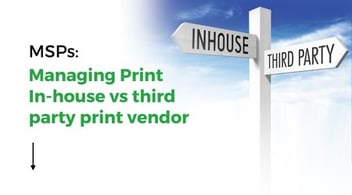Top 6 Tips for Selling Your MSP

Selling your MSP can be a stressful and emotional process.
Whether you’ve owned and operated your MSP for months, years, or even decades, the decision to sell is not often an easy one.
Before selling, many MSP owners toss and turn, mulling over the decision before pulling the trigger. It’s a major, life-changing decision to put your business on the market. So make sure it’s done right!
If you’ve spent years of your life building your MSP empire, you want to stick the landing and hand the keys off smoothly - not just for your own benefit but also for your staff and client base that you’ve worked so hard to build relationships with.
That’s why Print Partner is here to help you navigate the ins and outs of selling your MSP.
We’ve partnered with hundreds of MSPs across the United States and Canada, providing managed print services to their clients. We take the burden of print off of their hands so they can focus on higher-priority tasks.
We have first-hand experience running and selling MSPs - in fact, our Print Partner founder and owner Mitch Kranitz founded and sold two MSPs before creating this channel program.
In this article, we’ll review what to do (and what NOT to do) when selling your MSP.
To create this article, we’ve teamed up with Brent Whitfield of New Charter Technologies, a nationwide MSP platform. Brent’s role in the company is to acquire new MSPs under New Charter’s network, making him an essential resource for MSPs looking to sell. He has been involved in the successful acquisition of 24 MSPs over the past four years, including the sale of his own MSP.
If you want advice on selling, look no further than Brent, who has spearheaded the purchase of dozens of MSPs and knows precisely what key factors make for a promising acquisition.
1. Show EBITDA Growth Leading Up to Sale
When private equity firms consider purchasing your MSP, they aren’t looking for a “fixer-upper.” They want a company that is already thriving with an upward trajectory.
Consider your company’s EBITDA growth in the years leading up to the sale. Brent Whitfield recommends avoiding investments that could lower your EBITDA in the two years leading up to selling.
While investing in new technology and tools may seem attractive, doing so will increase your business expenses and risk.
The same goes for expanding your team - adding new staff members also increases company expenses. Growing your business’ technology and personnel is excellent for the long term but does not necessarily align with investors' goals.
Don’t add significant expenses and lower your EBITDA in the two years before selling!
2. Don’t Force Contract Extensions
When selling their MSP, many owners look for ways to spruce their business up before going to market.
One of the ways many owners do so is by reworking and extending their existing contracts. Some MSP owners looking to sell will aggressively push their clients into extending their contracts for longer periods than initially agreed upon.
After all, longer contracts indicate more time the MSP is guaranteed to generate revenue.
However, many owners fail to realize that MSP acquirers don’t care about the length of a business’ contracts.
Despite the contract being “longer,” your clients are never guaranteed to work with you for the agreed-upon time stated in the contract. There are countless ways to break an MSP contract, like citing performance or service issues.
Longer agreements lead to increased risk, as your MSP is obligated to provide service for them for the duration of the contract.
While not so concerned with contract lengths, potential buyers are much more concerned about your client retention. Clients who have renewed with you multiple times indicate that you’ve cultivated a healthy and sustainable business model.
In summary, focus less on contract length and more on retention!
3. Don’t Hide Bad Financials
Let’s face it: no MSP is perfect.
Regarding financials, MSPs often have a few skeletons in their closets. Don’t try to hide them!
When you get to the stage where you’re having serious conversations with a prospective buyer, be upfront about your company’s financial blemishes. Honest and open communication is the only way forward.
Based on his experience purchasing MSPs, Brent Whitfield advises: “Avoid hiding or masking ‘ bad news’ in your financials. Be upfront, because our financial analysts will find these ‘skeletons’ anyway, and losing trust can be more costly in a transaction like this than any financial issue you are trying to hide.”
Hiding bad financials will, at best, make the deal more time-consuming for the buyer’s analysts and, at worst, break your prospective purchaser’s trust and lose the sale.
Honesty and openness are always key!
4. Avoid Unnecessary Layoffs
As we mentioned earlier, showing strong EBITDA growth is a marker of success for MSPs looking to sell their company.
However, there are right and wrong ways to increase your EBITDA.
The right way is to make intelligent financial decisions. Steer clear of additional expenses leading up to the sale.
However, some MSP owners look for ways to quickly improve their EBITDA, one of the easiest being layoffs.
While layoffs will decrease your expenses, they also damage your company in the long term, especially when you lose managers or anyone critical to your operation’s workflow.
Investors want a business that can scale and grow over time. Laying off key team members will only hinder that growth and could lead to operational inefficiencies. Not to mention the effects of mass layoffs on your MSP’s workplace culture.
Layoffs paired with a business sale are a one-two punch your team may not want to stick around for.
This is not to say that all layoffs look bad - on the contrary, right-sizing is essential to a healthy business. Buyers also don’t want to see a team bloated with staff members unfit for the organization.
If it makes sound business sense to lay off staff members close to an acquisition, so be it. Should your prospective buyer ask you about it, be ready to defend your decisions!
5. Share Your KPIs and Goals
It might sound cliche, but at the root of your negotiations with potential buyers, the question they want answered is, “What makes your MSP special?”
Financials, contract lengths, and EBITDA only go so far. To give them a complete picture of your company, share your goals, biggest challenges, and biggest wins.
Consider what your key performance indicators (KPI) are. You and your team should know your business goals inside and out, and when you go to sell, so should your buyer.
KPIs show where your business is and where you want to be. KPIs are essential to understanding your company’s strengths and weaknesses. It also helps them know your team’s leadership style and how the company is run. This level of transparency is vital in reassuring them that your business is a safe buy.
If you don’t have well-defined markers of success, this will be a red flag for a potential buyer.
So, share your goals with them. Help them understand where your business is, and where you want it to go.
6. Emphasize Your Company Culture
Remember that financials are not everything.
Much like KPIs and goals, understanding your company culture will give your buyer critical insights into what makes your MSP tick.
Buyers want an easy, seamless transition when they purchase a new MSP. If your culture and management philosophies align with theirs, the transition will be easier for your company and prospective buyer.
To ensure your company cultures align, we recommend contacting a handful of the buyer’s prior acquisitions. Ask the investor for their five most recent purchases and their contact information.
This will give you insights into who you're dealing with. Are these other MSPs like yours, or are they wildly different? Are these folks your staff could share an umbrella with?
If the answer is no, you may need to keep shopping.
Investors are not looking to fit a square block in a round hole. If company cultures don’t make sense, neither will the deal.
Print Partner, New Charter Technologies, and Making the Sale
The sale of your MSP can be an overwhelming process, but we hope that this article gave you some helpful tips to help guide you on your seller's journey.
Whether you are just starting to think about selling or you’re in the middle of an active sale, look no further than our friends at New Charter Technologies.
In New Charter’s equity partnership program, the organization invests in MSPs while maintaining their organization’s identity. And Brent Whitfield, the organization’s equity director, has first-hand experience of what it’s like selling his MSP to New Charter.
Prior to his current role, Brent founded and ran his own MSP until it was acquired by New Charter. During this transition, he observed the freedom New Charter let his MSP have.
“PE Firms in our space have a reputation of screwing things up!” says Brent. “They often force companies into an unfamiliar service delivery model, causing the owners to leave, then the employees to leave, and ultimately the clients leave. New Charter is the only platform where ALL the founders stay.”
New Charter offers a unique solution for MSP owners interested in staying involved with their organizations post-sale. After the acquisition, owners will still be their company’s president and retain their duties as head of their organization. The program also allows owners to invest in a national platform and take their entrepreneurial journey to the next level.
If you want to learn more about how New Charter can help you sell your MSP, Discover more.
And if you want help with dealing with your clients’ print, consider working with Print Partner! We take the burden of print off of your hands, and we pay you for your referrals.
For every qualified referral we close, we’ll pay the person who registers the opportunity at least $500 for the introduction and an additional $250 per $25K in revenue the deal brings us. We'll then pay your MSP $1,000 per copier we sell, $100 per printer we sell, and a recurring 5% of their lifetime print allotment, so you can continue to earn commission for years after the deal closes.
So end those pesky copier troubleshooting calls and get paid to do less work. Consider partnering with us, a Print Partner you can trust.


.jpg?width=352&name=How%20to%20Renegotiate%20Your%20MPS%20Contract_Thumbnail%20(1).jpg)
.jpg?width=352&name=How%20to%20talk%20to%20your%20MSPs%20customers%20about%20managed%20print%20services_Thumbnail%20(1).jpg)